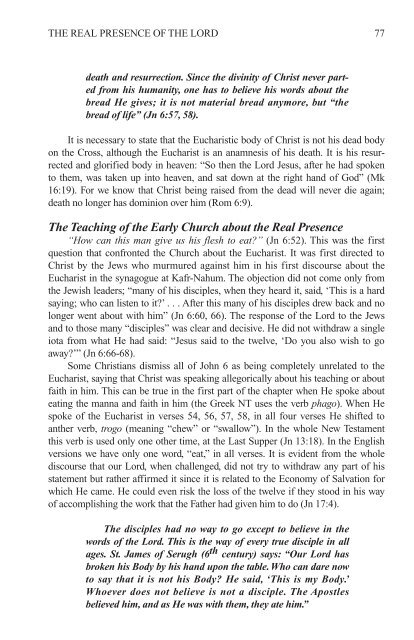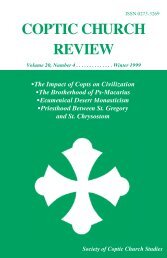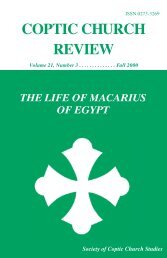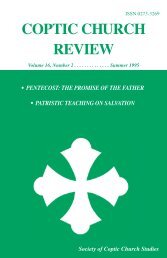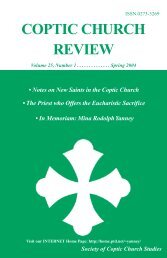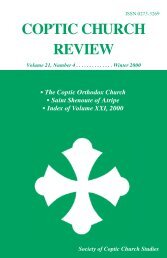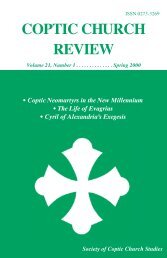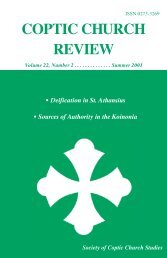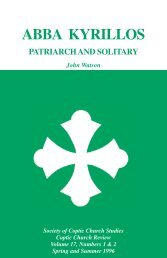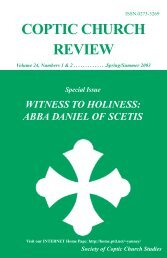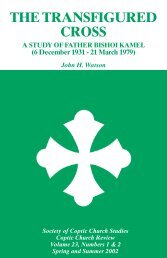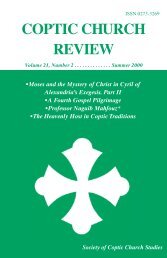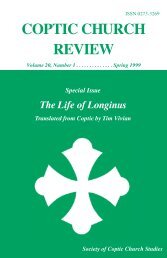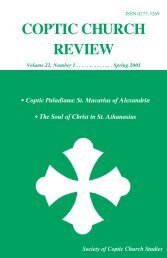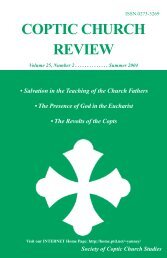2004 Fall.Vol25.#3.pdf - Coptic Church Review
2004 Fall.Vol25.#3.pdf - Coptic Church Review
2004 Fall.Vol25.#3.pdf - Coptic Church Review
Create successful ePaper yourself
Turn your PDF publications into a flip-book with our unique Google optimized e-Paper software.
THE REAL PRESENCE OF THE LORD 77<br />
death and resurrection. Since the divinity of Christ never parted<br />
from his humanity, one has to believe his words about the<br />
bread He gives; it is not material bread anymore, but “the<br />
bread of life” (Jn 6:57, 58).<br />
It is necessary to state that the Eucharistic body of Christ is not his dead body<br />
on the Cross, although the Eucharist is an anamnesis of his death. It is his resurrected<br />
and glorified body in heaven: “So then the Lord Jesus, after he had spoken<br />
to them, was taken up into heaven, and sat down at the right hand of God” (Mk<br />
16:19). For we know that Christ being raised from the dead will never die again;<br />
death no longer has dominion over him (Rom 6:9).<br />
The Teaching of the Early <strong>Church</strong> about the Real Presence<br />
“How can this man give us his flesh to eat?” (Jn 6:52). This was the first<br />
question that confronted the <strong>Church</strong> about the Eucharist. It was first directed to<br />
Christ by the Jews who murmured against him in his first discourse about the<br />
Eucharist in the synagogue at Kafr-Nahum. The objection did not come only from<br />
the Jewish leaders; “many of his disciples, when they heard it, said, ‘This is a hard<br />
saying; who can listen to it?’ . . . After this many of his disciples drew back and no<br />
longer went about with him” (Jn 6:60, 66). The response of the Lord to the Jews<br />
and to those many “disciples” was clear and decisive. He did not withdraw a single<br />
iota from what He had said: “Jesus said to the twelve, ‘Do you also wish to go<br />
away?’” (Jn 6:66-68).<br />
Some Christians dismiss all of John 6 as being completely unrelated to the<br />
Eucharist, saying that Christ was speaking allegorically about his teaching or about<br />
faith in him. This can be true in the first part of the chapter when He spoke about<br />
eating the manna and faith in him (the Greek NT uses the verb phago). When He<br />
spoke of the Eucharist in verses 54, 56, 57, 58, in all four verses He shifted to<br />
anther verb, trogo (meaning “chew” or “swallow”). In the whole New Testament<br />
this verb is used only one other time, at the Last Supper (Jn 13:18). In the English<br />
versions we have only one word, “eat,” in all verses. It is evident from the whole<br />
discourse that our Lord, when challenged, did not try to withdraw any part of his<br />
statement but rather affirmed it since it is related to the Economy of Salvation for<br />
which He came. He could even risk the loss of the twelve if they stood in his way<br />
of accomplishing the work that the Father had given him to do (Jn 17:4).<br />
The disciples had no way to go except to believe in the<br />
words of the Lord. This is the way of every true disciple in all<br />
ages. St. James of Serugh (6 th century) says: “Our Lord has<br />
broken his Body by his hand upon the table.Who can dare now<br />
to say that it is not his Body? He said, ‘This is my Body.’<br />
Whoever does not believe is not a disciple. The Apostles<br />
believed him, and as He was with them, they ate him.”


